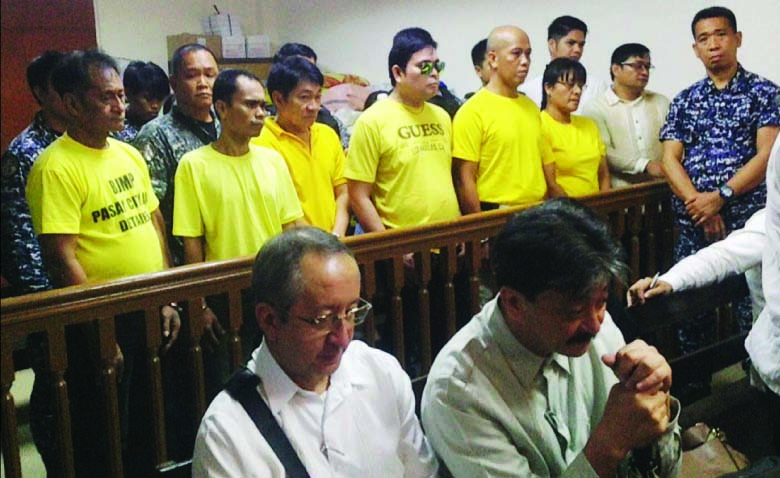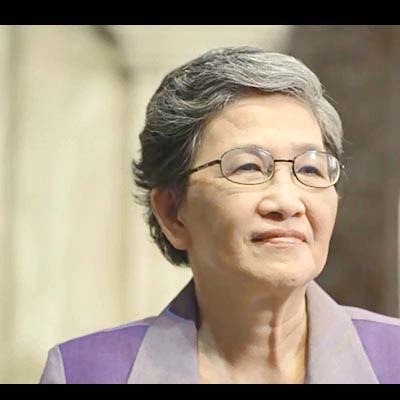Sister Becky Ortega, a trainer at the Brahma Kumaris, ran an excellent workshop on “Building Inner Resilience and Inner Peace” for members of the Movement for Restoration of Peace and Order on July 2. Most MRPO members are kidnap victims or their relatives who experienced trauma from the ordeal. The grief and pain are life-changing, especially if the victim dies during abduction.
Sr. Ortega advised MRPO members on how to meet adversities and draw from their inner strength and positive values. Engaging abductors in conversation humanizes them. It also helps ease people’s fears and suffering when they lift up their burden to the Supreme Being, seek divine help and center their thoughts on the people they love.
Just before the lecture, MRPO members attended the promulgation of the decision on the kidnap-for-ransom with double murder case against the Exequiel Cautiver and his wife Penelope. Both were active duty police officers holding the rank of Chief Inspector when they perpetrated the crime in 2008.
Former Dasmariñas, Cavite Vice Mayor Victor Carungcong, the mastermind and financier, had hired Cautiver to kill his brother-in-law, Demosthenes Cañete, a business rival. Cautiver hired the gunman, but the group got greedy and demanded ransom even after they had killed Cañete and his driver. The payoff of nearly a million pesos was consummated.Fortunately, police intelligence led to the arrest of the perpetrators.
It took the Cañete family eight years to find closure. They had spent a considerable sum to see the trial through, even after being harassed and threatened. MRPO lauded the family’s persistence and commitment to find justice.

Cautiver was also implicated in the 2007 kidnap-for-ransom case of a Filipino of Pakistani descent. Sadly, evidence was not enough to pin him down. Had the earlier case prospered, Cañete would not have been killed, lamented Cañete’s daughter Joan, a lawyer.
Operatives of the Police Anti-Crime and Emergency Response led by Colonels Eleazar Guillor and Edgar Iglesia worked hard to achieve the breakthrough. It highlights the fact that there are indeed good and upright officers in the police force. Unfortunately, the few bad eggs like Cautiver spoil the reputation of the entire institution.
The overhaul of the criminal justice system is something our new president, Rodrigo Duterte, must look into. Why do people applaud summary execution? Why do people rejoice when shortcuts are resorted to? Why do court trials take so long?
We told the Cañete family that eight years may seem long, but that’s how long most of our cases last. Of the cases we’ve handled, the longest it has taken for judgment to be handed down is a record 21 years.
The flawed criminal justice system is what makes summary executions so popular among many victims of crime. But these should not happen in a civilized society. I have to ask if the alleged drug pushers were killed, so they would not reveal who their financiers and drug lords are?
As social advocate Jaime Garchitorena said, “Having no rules is not freedom, that’s called anarchy.”
Before total chaos and anarchy sets in and becomes irreversible, the President and his men must start laying down rules and observing those already in place.
Philippine interest
The United Nations Arbitral Tribunal handed down on July 12 its decision on the case filed by the Philippines against China’s nine-dash line. Days before the decision was issued, media people asked me how the Chinese-Filipino community would react to the decision.
I had to clarify which sector of the Tsinoy community the reporter was referring to. The xinyimin or new immigrants will all defend China, right or wrong. On the other hand, the older Chinese Filipinos who have been in the Philippines for generations will not want war.They are business people and know war is bad.
Some of them may support the Philippines, some may be sympathetic to China, but most of them will keep quiet or keep neutral. They will not express their sympathy to the Philippines for fear of antagonizing China or, at the very least, the Chinese Embassy.
They cannot side with China either because they are, after all, Filipino citizens. Many of them, however, do not agree with how the Philippine government uses the American card in dealing with the matter. They believe that the Duterte administration may be more open to diplomacy and going back to the negotiation table.
The younger generation stands with the Philippines.They may not understand what underlies China’s claim, but they support the Philippine position. Academics like me support the validity of the Philippine claim but understand where China is coming from. China, however, needs to understand that although the United States is a crucial factor behind the Philippines, it is not the be-all and end-all rationale behind the defense of Philippine sovereignty.
Sovereignty is non-negotiable, for both the Philippines and China. Clearly, there is no way to resolve the dispute except through diplomacy. Now that the Philippines has won its case, the more reason it has to return to the negotiating table and engage China calmly and rationally. Let the sovereignty issue be shelved in the meantime. The Philippines and China can work toward cooperation in many other areas. — First published in Tulay Fortnightly, Chinese-Filipino Digest 29, no. 4 (July 19-August 8, 2016): 5.
